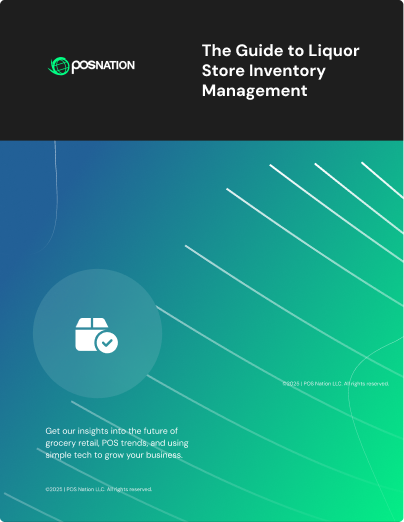Opening a liquor retail business comes with a long checklist, and getting your liquor license is one of the biggest hurdles.
Some states keep the process fairly straightforward, while others require additional background checks, zoning approvals, and public notices — all of which can slow things down.
This blog walks through how to apply for a liquor license, including required documents, common pitfalls, and what to expect based on your specific location.
How To Apply for a Liquor License in 2026
The liquor license application process varies by state, but usually follows a similar structure — figure out what licenses you need, gather your documents, fill out the application, and wait for approval.
It sounds simple enough until you start to factor in additional background checks, license auctions, hidden fees, public notices, and any other state-specific requirements.
To help you stay on track, here’s a step-by-step walkthrough of what the process usually looks like for retailers across the U.S.
Step 1: Pick Your License & Understand State Rules
First, figure out which licenses you need to apply for based on what type of alcohol you’re selling, where you’re selling it, and how customers will consume it.
License categories include:
- Off-premise retail licenses for liquor stores, grocery stores, or convenience stores selling alcohol to take away
- On-premise licenses for bars, restaurants, hotels, or clubs where customers consume alcohol on-site
- Beer and wine only licenses for businesses limited to those products
- Special permits for catering, tastings, delivery, events, or Sunday sales
The next steps vary depending on whether your business operates in a control or license state:
- Control states (like Utah and Pennsylvania) manage distribution directly and limit how many businesses can sell alcohol.
- License states (like Texas and Florida) let private businesses apply directly, but often use quotas, lotteries, or auctions to control availability.

(Image source: Overproof)
If there aren’t any new licenses available in your area, you may need to buy one from another business. Some states allow transfers, which involve similar steps to applying from scratch. Temporary permits may also be available so you can keep operating during the process.
Step 2: Gather Documentation
After determining the license or permits you need, the next step is to collect all required paperwork. Most states ask for detailed information about your business, ownership, and finances before they can review your application.
Related Read: How Much is a Liquor License? [ + 4 Things To Consider]
As part of the process, any business selling alcohol or tobacco in the U.S. must register with the Alcohol and Tobacco Tax and Trade Bureau (TTB), which involves submitting Form TTB F 5630.5d either by mail or through the TTB’s online permits portal.
Other documents often requested include:
- Government-issued ID
- Federal employer identification number (EIN)
- Business formation documents (LLC or incorporation paperwork)
- Lease, deed, or proof of legal occupancy
- Personal financial statements
- Background check authorization and fingerprint cards
- Zoning approval or land use permit
- Public notice affidavits or proof of publication
For example, a liquor store owner in Texas must submit detailed floor plans that show storage and sales areas, as well as proof that the location complies with zoning regulations.
Since requirements vary, check your state’s Alcoholic Beverage Control (ABC) agency or the TTB’s state-by-state licensing board for the complete list of what you’ll need. Some business owners also hire brokers or attorneys to help them properly navigate this notoriously complex process. 
Step 3: Submit Your Application & Pay Fees
Once your paperwork is ready, you can then submit your application — but you likely need to pay fees, which can range from several hundred to thousands of dollars depending on your state, license type, and business model.
States handle licensing in two main ways:
- In license states like California, new licenses may only become available through lotteries, auctions, or quota releases. Since demand often exceeds supply, licenses are more expensive and harder to get.
- In control states like Pennsylvania, the state regulates distribution and sales through government-run stores or designated agencies, which approve fewer businesses and often set store locations based on population size or geographic boundaries.
After you apply, you’ll then go through a review period that could include inspections or follow-up questions. Some approvals take just a few weeks, others can take months.
Beyond application fees, budget in ongoing expenses related to your liquor license in your business plan, including yearly renewal fees. Failing to comply with relevant liquor laws can result in fines, suspension of your license, or even removal.
Related Read: How To Secure Liquor Store Financing [+ Top Solutions]
Step 4: Post Public Notice & Handle Objections
The notice period, which often lasts between two and six weeks, gives the local community an opportunity to raise any legitimate concerns. If objections do come up, you may need to attend a hearing or provide additional information to address those issues.
Here’s an example: If a new liquor store in Oregon submits its application, it must comply with the Oregon Liquor and Cannabis Commission (OLCC) public notice requirements. This means posting a visible, written notice provided by the OLCC on their storefront for at least 10 calendar days before the OLCC makes a final decision on the application.
Note that not all states handle this step the same way — some may require only a posted sign, others both a sign and a published notice. A few states may even have additional public notification methods, such as online postings or mailings to nearby residents.
As with all the outlined steps, be sure to cross-check with your state and county’s specific liquor licensing rules.
Step 5: Complete Final Reviews & Wait for Approval
After posting your notice and completing any required hearings, your application moves toward final review. At this stage, the agency will verify your documents, confirm inspection results, and check that you’ve completed any and all outstanding requirements.
Let’s say a liquor store in Florida recently passed its inspection but still needs to clarify its business ownership structure. If the paperwork doesn’t match what’s on file with the state, the agency will pause the process until it’s corrected.
Once approved, you’ll receive instructions on displaying your license and renewal requirements. Certain states also require ongoing compliance reports, such as monthly sales or delivery records. An industry-specific point of sale (POS) system with built-in age verification and reporting capabilities can save time and help you maintain compliance year-round.
You Got the License — Here’s How To Keep It
Applying for a liquor license can feel overwhelming, especially with all the differing rules, paperwork, and timelines to keep track of — but breaking the process down into actionable steps helps you stay prepared.
Once you have your license, staying compliant is just as important, and POS Nation can help every step of the way.
With features to verify customer age at checkout, track regulated inventory in real time, and generate detailed sales reports for audits, POS Nation’s industry-specific system takes the guesswork out of legal compliance.
Visit our Build and Price page to customize a POS system tailored to your store’s size and needs, so you can focus more on what matters most — running a successful business.







![4 Best POS Systems for Beer Stores in 2026 [Features, Pricing, & Reviews]](https://www.posnation.com/hs-fs/hubfs/Blog%20Featured%20Images/POS-system-for-beer-store.webp?width=520&height=294&name=POS-system-for-beer-store.webp)

 by Cort Ouzts
by Cort Ouzts

 by Spence Hoffman
by Spence Hoffman